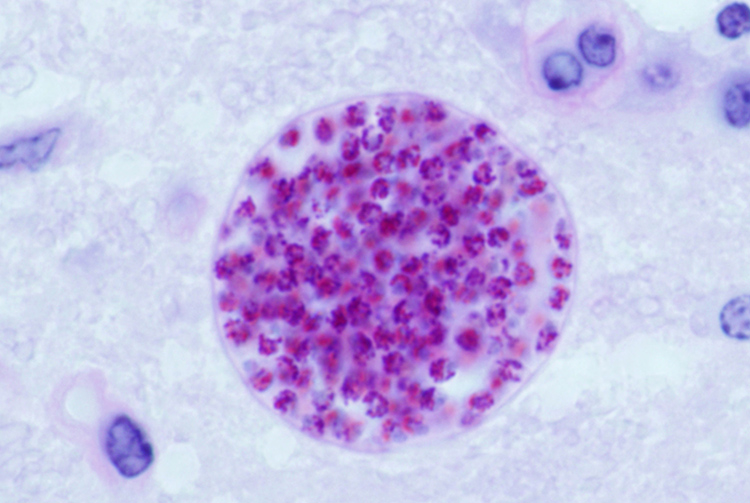Monster Monday: The Mind-Controlling Parasite
December 14, 2015
Not feeling like yourself lately? It’s probably just a passing sensation. But if you are a mouse, you just might be under the influence of a mind-controlling parasite—Toxoplasma gondii.

Microscopic cysts containing Toxoplasma gondii develop in the tissues of many vertebrates. Here, in mouse brain tissue, thousands of resting parasites (stained red) are enveloped by a thin parasite cyst wall. Credit: Jitender P. Dubey, United States Department of Agriculture
A parasite is a creature that lives on or in another living thing, called the host, taking advantage of the host’s resources. T. gondii is a type of single-celled creature called a protozoan. It can live inside the body of a wide variety of warm-blooded animals, but a critical stage in its life cycle is only known to take place in felines. The creepy part is how the parasite spreads from cat to cat.
Cats get T. gondii mainly from eating rodents infected with the parasite. Rodents, such as mice, pick up the parasite from their environment. But T. gondii does not sit idle inside the rodent’s body, waiting for it to be picked off by a prowling feline. Instead, T. gondii somehow alters its host’s behavior. Normal rodents have an instinctive fear of felines—just a whiff of feline scent is generally enough to send a mouse scurrying for safety. But rodents with T. gondii show a decreased aversion to feline smells. This dampening of instinct makes it more likely that the rodent will engage in risky behavior, increasing the odds that it will be eaten by a cat and thus spread the parasite.
So much for the mouse, you might think. But we human beings love our cats—Westerners keep more cats as pets than any other animal. So it may not be too surprising that scientists estimate that one-third to one-half of all people may be chronically infected with T. gondii, which can lead to a disease called toxoplasmosis. Toxoplasmosis is rarely serious in healthy people. But the parasite remains in the body after symptoms pass, and scientists have begun to wonder whether the same mechanism that makes infected rodents fearless could also contribute to reckless behavior among people. One small study intriguingly suggests that people infected with T. gondii are more likely than others to be involved in traffic accidents.
Additional World Book articles:
- Pregnancy
- Friends Indeed: Pets and Your Health – A Special Report
- Infections Spread by Pets – A Special Report


